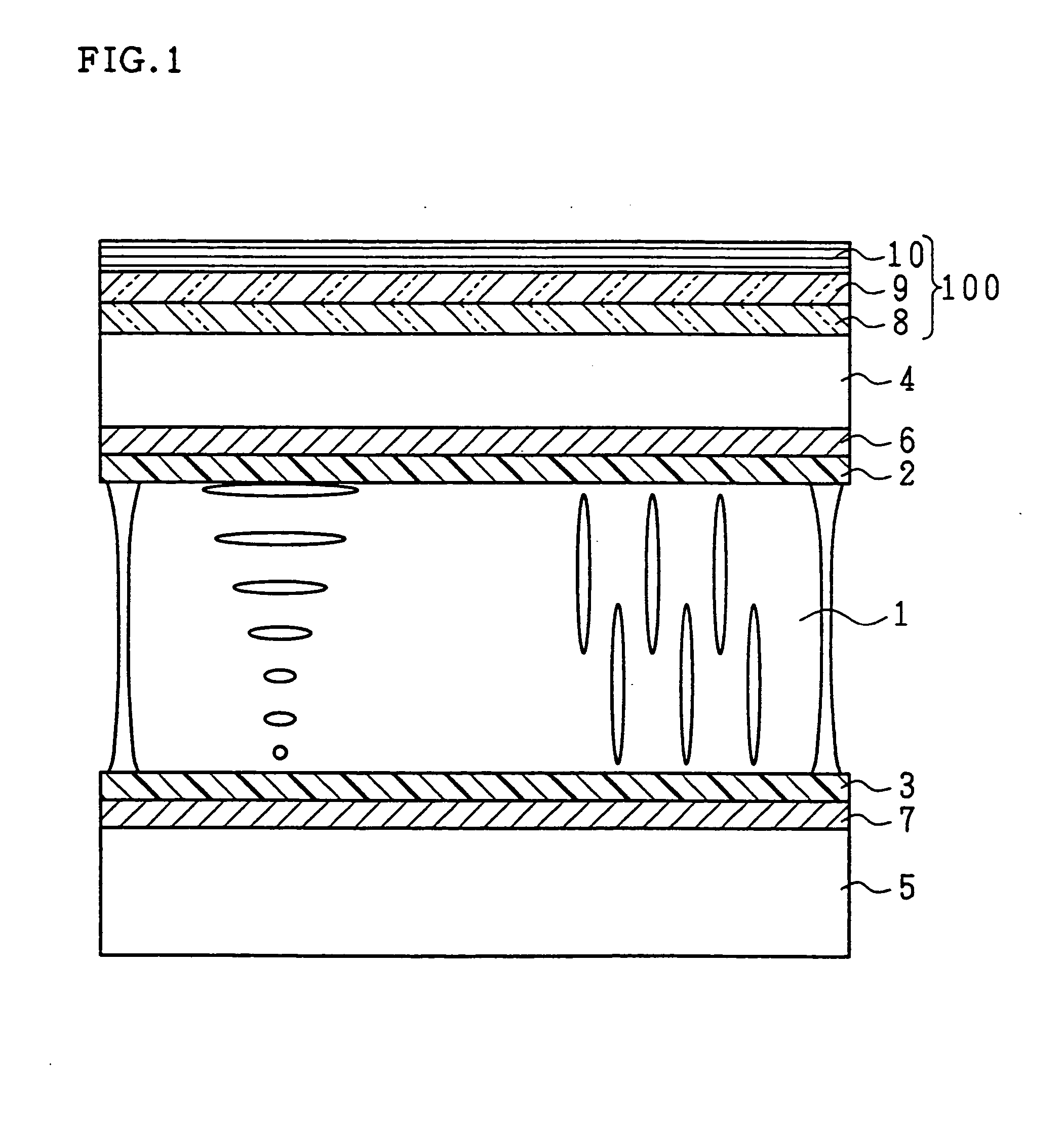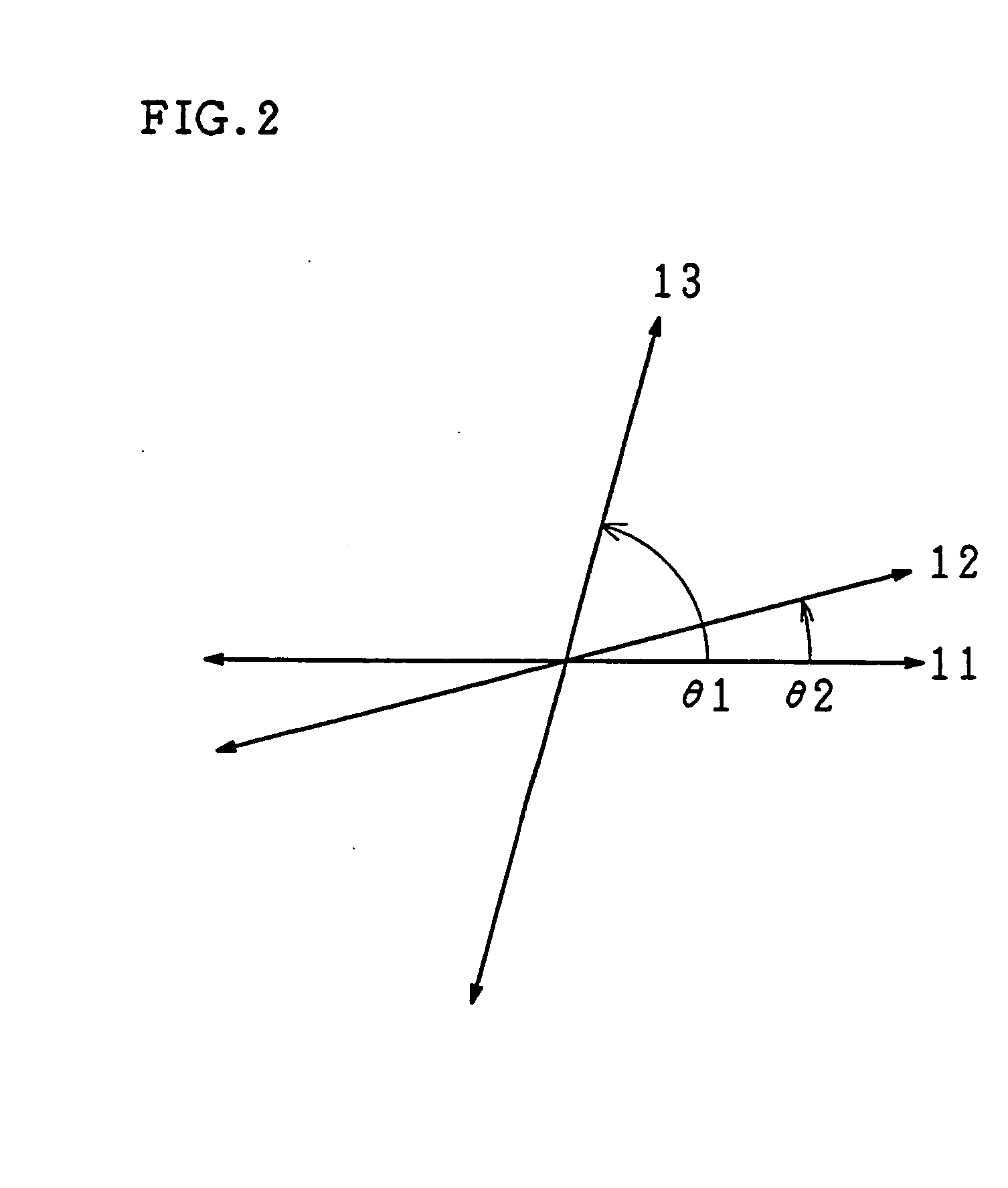Reflective liquid crystal display device and reflective liquid crystal display device incorporating touch panel arranged therefrom
- Summary
- Abstract
- Description
- Claims
- Application Information
AI Technical Summary
Benefits of technology
Problems solved by technology
Method used
Image
Examples
first embodiment
of the Invention
Referring to drawings, the following description will discuss an embodiment in accordance with the present invention.
FIG. 1 is a cross-sectional view schematically showing a structure of a major part of a reflective liquid crystal display device of an example in accordance with the present invention. As can be seen from FIG. 1, the reflective liquid crystal display device includes a liquid crystal layer 1 that contains twisted nematic liquid crystal having a positive dielectric anisotropy, sandwiched between a substrate 4 on which an alignment-processed alignment layer 2 is formed and a substrate 5 on which a similarly alignment-processed alignment layer 3 is formed. Further, on the lower substrate 5, there is disposed a light reflective film 7; preferably, the reflecting surface of the light reflective film 7 has such smooth concavities and convexities that preserve the polarization throughout the reflection of light. More preferably, the smooth concavities and co...
example 1
First, as Example 1, the description below will explain an evaluation of specifications of the liquid crystal layer by means of calculation, that are required to specifically design the liquid crystal layer with the optical functions thereof being taken into consideration. For optimum design of the liquid crystal layer, the evaluation function given by Equation (2) is used to evaluate specifications of the liquid crystal layer:
f=1−s32 (2)
Here, s3 is a Stokes parameter to specify a polarization state, more specifically, a Stokes parameter regarding the polarization state of the light that has passed through the liquid crystal layer only once on the reflecting surface. Note that the Stokes parameter used here is normalized.
When the intensity of light is normalized, the polarization state of the perfectly polarized light of which the polarization state can be described by a Stokes parameter having three components: s1 and s2 represent the respective linearly polarized light comp...
example 2
In Example 2, reflective liquid crystal display devices structured as in aforementioned FIG. 1 were fabricated with parameters listed in table 1 to obtain five Samples #2a through #2f.
TABLE 1SampleParameter#2a#2b#2c#2d#2e#2fΔnd260330120380260260θ3 (°)404040405520Twist Angle (°)7070707040110θ1 (°)757575757575Retardation Caused by Optical135135135135135135Retardation CompensatorPlate 8θ2 (°)151515151515Retardation Caused by Optical270270270270270270Retardation CompensatorPlate 9
Display results of Samples are shown roughly in Table 2.
TABLE 2SampleVoltage#2a#2b#2c#2d#2e#2f0WhiteYellowishGrayOrangishReddishGrayDisplayWhiteWhiteWhiteDisplayDisplayDisplayVthWhiteWhiteGrayYellowishYellowishGrayDisplayDisplayWhiteWhiteDisplayDisplay1.5 × VthGrayGrayDarkWhiteWhiteDarkGrayDisplayDisplayGray2.0 × VthDarkDark GrayDarkGrayGrayBlackGrayGray3.0 × VthBlackBlackBlackDark GrayDark GrayBlack
Note that Vth refers to threshold voltage values where change in the alignment of the liquid crystal layer...
PUM
 Login to View More
Login to View More Abstract
Description
Claims
Application Information
 Login to View More
Login to View More - R&D
- Intellectual Property
- Life Sciences
- Materials
- Tech Scout
- Unparalleled Data Quality
- Higher Quality Content
- 60% Fewer Hallucinations
Browse by: Latest US Patents, China's latest patents, Technical Efficacy Thesaurus, Application Domain, Technology Topic, Popular Technical Reports.
© 2025 PatSnap. All rights reserved.Legal|Privacy policy|Modern Slavery Act Transparency Statement|Sitemap|About US| Contact US: help@patsnap.com



